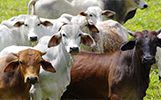| CAAB Brand Draws to Close, As Company–Backed Beef Brands Mature
Beef Central | February 5, 2018
In recognition of the evolution of company–based branded beef programs in Australia, the well–known Certified Australian Angus Beef brand program has drawn to a close, having fulfilled its commercial purpose.
I have seen a number of livestock people, farmers, ranchers and those who support the industry in one or another way getting embroiled in unpleasant discussions with fanatic vegans recently. The feeling that I am usually left with is that these exchanges are unlikely to result in any change.
After all, the vegans have made their mind up and nothing that we can say is going to change them, and on the other hand, the entire ag industry, and the majority of the people who read the exchange don't accept what the vegans are saying in the first place.
Remember, the beef industry is expanding; demand is increasing worldwide and so is supply. Maybe we could reduce our own stress levels by focusing on the people who do want our animal proteins and helping them understand and share the information that we are compassionate about animals, do care about the environment and are working to make the global industry sustainable.
A Letter to My Critics: Ranching Is Based on Compassion
Amanda Radke, Beef Magazine | January 23, 2018
It detailed the large investments these individuals have made in clean meats, plant–based proteins, vegan clothing lines and other companies that are based on elitist ideologies and the misguided notion that beef production is not sustainable. It wasn't surprising to have my email inbox fill with hate mail.
These activists and individuals don't want cattle, pigs, sheep and poultry to live freely in nature as they claim; they want them to cease to exist. They don't want these animals to nourish human lives; they think a bundle of kale and a spoonful of almond butter will help feed the world's impoverished. They don't want lifesaving by–products that livestock provide like insulin for diabetics or heart valves for replacement surgeries. They believe we can synthetically create alternatives for all of these things. And they don't value human life.
EU Trade Offer to South America 'Completely Unacceptable' for UK Beef Farmers 
Farming UK | February 3, 2018
An attempt by the European Union to increase their beef trade offer to 99,000 tonnes from South American countries has been branded "completely unacceptable".
The Latin American trade bloc Mercosur, which includes Brazil, Argentina, Paraguay and Uruguay, is currently in talks with a trade agreement with the EU.
But UK farmers have blasted the talks, who say that the South American countries do not come close to matching the food safety, animal welfare or environmental standards which farmers comply with in the UK and across Europe.
They fear that the big increase in the amount offered by the EU from Mercosur countries with lower welfare standards could put their their livelihoods at stake.
AAP Govt Defends Law Criminalising Consumption of Beef
The Beef Site | February 5, 2018
The Aam Aadmi Party (AAP, English: Common Man's Party) government on Monday defended in the Delhi High Court a law criminalising possession and consumption of beef in the national capital, saying the state was obligated under the Constitution to protect cows and other milch and draught animals from slaughter.
For those interested in, or even struggling with, understanding the Carbon Flows concept, I recommend Alan Lauder's Blog. You can find the whole series here.
What Really Is Paddock Resilience?
Alan Lauder, Soils for Life | February 2, 2018
The traditional definition of resilience is a paddock that is functional and able to withstand adverse conditions.
For those seeking tangible evidence of when resilience exists, it is the ability of a paddock to generate carbon flows from rain i.e. how well the pasture responds to rain. Perhaps the best test of resilience is the ability of paddocks to respond to isolated small falls of rain during a dry period.
A paddock that has the capacity to successfully produce carbon flows is one that is also well equipped to better withstand extreme events, be they drought, heat or heavy rain. | |
